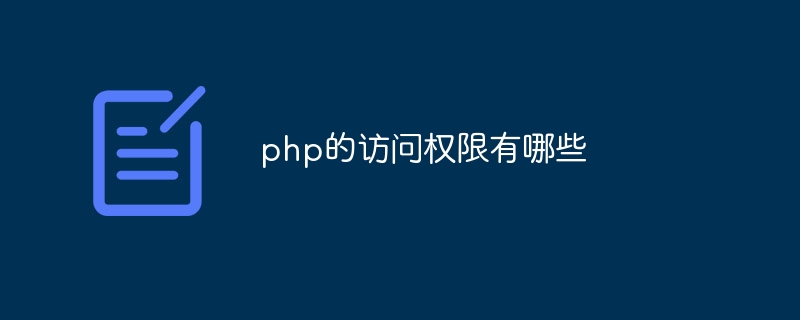
The access permissions of php include public access permissions, protected access permissions and private access permissions. 1. Public access rights, classes, properties and methods modified with public can be accessed anywhere, whether inside or outside the class; 2. Protected access rights, properties and methods modified with protected can only be accessed inside the class Or accessed in an inherited subclass, it cannot be accessed by instantiation outside the class; 3. Private access permissions. Properties and methods modified with private can only be accessed inside the class, not outside the class or in inherited subclasses.

The operating environment of this tutorial: windows10 system, php8.1.3 version, DELL G3 computer.
PHP is a popular open source programming language widely used in the field of web development. In PHP, access permissions are an important concept that determine how visible and accessible classes, properties, and methods are to other code. PHP provides three different access permission modifiers: public, protected, and private. This article will introduce these three access modifiers in detail.
1. Public access rights:
Public access rights are the loosest access rights modifier. Classes, properties, and methods modified with public can be accessed anywhere, whether inside or outside the class. A class modified by public can be instantiated by any file, and its properties and methods can also be accessed directly.
Example 1: public class
class MyClass { public $publicVar = 'public variable'; public function publicMethod() { echo 'This is a public method.'; } } $obj = new MyClass(); echo $obj->publicVar; // 输出:public variable $obj->publicMethod(); // 输出:This is a public method.
2. Protected access rights:
Protected access rights are more stringent than public access rights strict. Properties and methods modified with protected can only be accessed within the class or inherited subclasses, and cannot be instantiated and accessed outside the class.
Example 2: protected class
class MyClass { protected $protectedVar = 'protected variable'; protected function protectedMethod() { echo 'This is a protected method.'; } } $obj = new MyClass(); echo $obj->protectedVar; // Fatal error: Cannot access protected property MyClass::$protectedVar $obj->protectedMethod(); // Fatal error: Cannot access protected method MyClass::protectedMethod()
3. Private access rights:
Private access rights are the most stringent access rights modifier . Properties and methods modified with private can only be accessed within the class and cannot be accessed outside the class or inherited subclasses.
Example 3: private class
class MyClass { private $privateVar = 'private variable'; private function privateMethod() { echo 'This is a private method.'; } } $obj = new MyClass(); echo $obj->privateVar; // Fatal error: Cannot access private property MyClass::$privateVar $obj->privateMethod(); // Fatal error: Cannot access private method MyClass::privateMethod()
Summary:
Through the above examples, we can see the role of access permission modifiers in PHP and scope. Public access rights (public) are the loosest and can be accessed from anywhere; protected access rights (protected) are limited to within the class and inherited subclasses; private access rights (private) are limited to within the class. Proper use of these access permission modifiers can improve the security and maintainability of your code .
The above is the detailed content of What are the access rights of php. For more information, please follow other related articles on the PHP Chinese website!